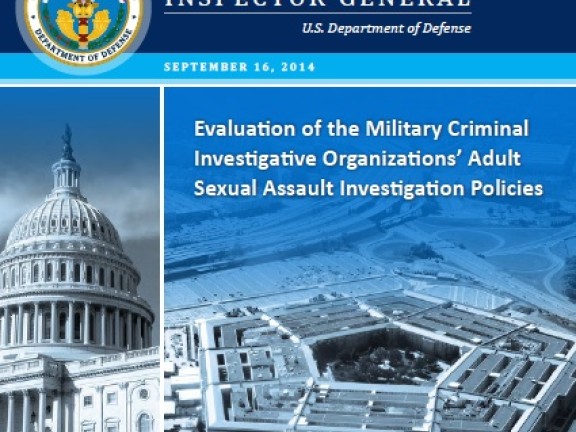Published September, 2014
Evaluation of the Military Criminal Investigative Organization’s Adult Sexual Assault Investigation Policies (2014)

The U.S. Department of Defense (DoD) Office of Inspector General (OIG) issued a report on September 16, 2014, on its three-year-long evaluation of policies governing military investigation of sexual assaults. The OIG had been asked to determine if the Military Criminal Investigative Organization’s (MCIO) policies and procedures comply with DoD requirements, service requirements, Council of Inspectors General on Integrity and Efficiency (CIGIE) Quality Standards for Investigations (QSIs), and accepted law enforcement investigative techniques.
A 2012 confidential Pentagon survey of active duty military personnel estimated that 26,000 men and women were sexually assaulted. According to the Department of Defense Annual Report on Sexual Assault in the Military for the 2013 fiscal year, provided to Congress on May 1, 2014, a total of 3,374 cases had been reported 2012. In contrast, 5,061 cases were reported in 2013, a fifty percent increase. Both the White House and DoD praised the more recent report as an indication that victims are becoming more comfortable reporting sexual assaults. But the May 2014 report did not contain an estimate of the overall number of assaults in 2013 leading critics to say there is no basis for comparison since the overall number of assaults may have increased. Furthermore, of the more than 5,000 military sexual assaults reported in 2013 only 484, fewer than 10%, went to trial, resulting in 376 convictions.
According to a report in the New York Times, “more women and men have come forward to say that they do not trust their commanders to properly handle accusations of sexual assault.” In March 2014, an effort by Senator Kirsten E. Gillibrand (D-NY) to have independent military prosecutors rather than a victim’s commander oversee sexual assault cases failed when she was unable to secure the sixty votes needed to move the bill forward.
The DoD evaluation of investigative procedures does not address the role of commanding officers in sexual assault investigations. The report says the MCIO’s policies and procedures for investigating adult sexual assault “support the investigating agency’s needs for a thorough investigation.” It also concludes that “the investigating organizations have incorporated nearly all DoD and Service adult sexual assault investigative requirements into their policies.”
Copyright Information: CHLP encourages the broad use and sharing of resources. Please credit CHLP when using these materials or their content. and do not alter, adapt or present as your work without prior permission from CHLP.
Legal Disclaimer: CHLP makes an effort to ensure legal information is correct and current, but the law is regularly changing, and the accuracy of the information provided cannot be guaranteed. The legal information in a given resource may not be applicable to all situations and is not—and should not be relied upon—as a substitute for legal advice.